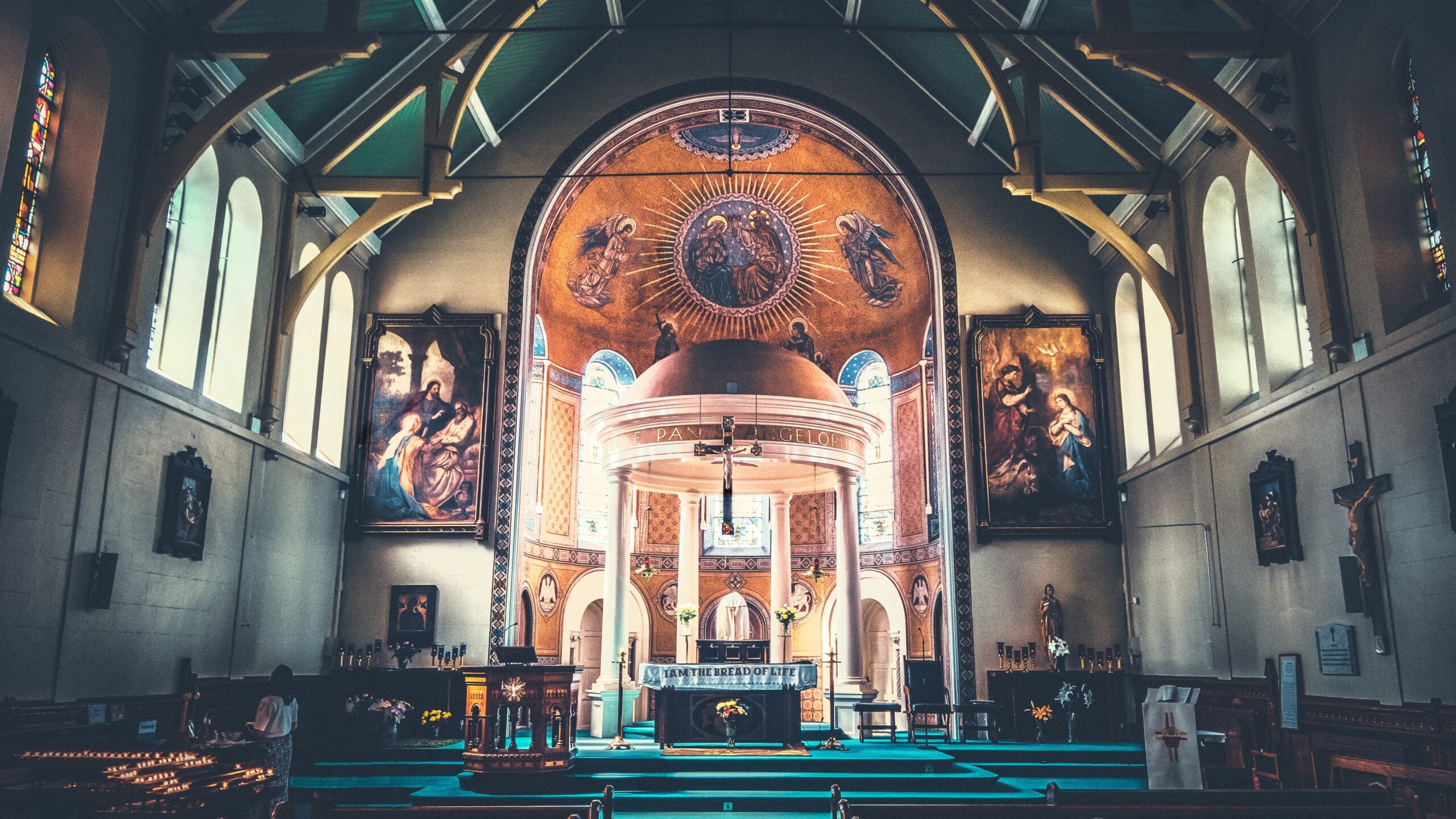Colleen Baer (C’22) Contributes to Research at the Intersection of Religion and Reconciliation in Ireland
As part of the Figge Fellows Program, Colleen Baer (C’22) is researching the impact of the Catholic Church’s sex abuse crisis on the challenges of peace making in Northern Ireland. Though peace negotiations in the 1990s led to the successful signing of the Good Friday Agreement in 1998, the process of reconciliation has taken much longer and is still ongoing.
“Colleen’s work studies how the road to reconciliation is complicated by the Catholic Church’s compromised position,” says Cóilín Parsons, director of the Global Irish Studies program. “Given the Catholic Church’s message of forgiveness and reconciliation, especially under the current Pope, the Church should be a vital partner in building the future in a country that was riven by strife that tended to play out along sectarian lines. But the Church’s moral authority is damaged, perhaps irreparably, in the wake of the child sex abuse scandal and the scandals of institutional abuse of single mothers.”
Research and Religion

Colleen Baer (C’22)
Prior to joining the Figge Fellows Program, Baer wanted to learn more about Irish culture to prepare for her to study abroad in Dublin during the Spring 2021 semester, so began to take courses focused on Ireland at Georgetown.
Though the study abroad trip was ultimately canceled due to COVID-19, Baer’s interest in Irish studies intensified after taking a course called the Vatican and Ireland. In addition to her coursework for this class, Baer read Say Nothing, a memoir that chronicles the Troubles.
“After reading that book, I became deeply interested in that time period and decided to write my research paper on it,” Baer says. “My motivating question was ‘why is peace in Ireland fragile?’ because I noticed that phrase was often repeated by government officials and I was curious as to why.”
As she dug for answers, Baer discovered that the Catholic Church did not occupy the same authoritative position that it used to.
“I became interested in this relationship after reading about how some priests attempted to facilitate peace in their communities only to see their work impeded by people’s negative perceptions of the Church as an institution,” Baer explains. “There were a variety of reasons that the authority of the Catholic Church started to decline, but one of the things that really struck me was the crisis of faith that people in Ireland went through due to the sex abuse crises in both the U.S. and Ireland.”
Though she only touched on this shift in her initial course paper, Baer says the dynamic stuck with her and ultimately led her to apply and be accepted to the Figge Fellowship Program to continue her work.
While the paper is still in the early stages, Baer’s research will closely examine whether the deterioration in the public’s perception of the Church since the 1990s has had any impact on the peace process, such as if the public opinion of the Church changed among various populations in Northern Ireland.
Parsons, who teaches an Irish literature course that Baer is enrolled in this semester, explains that the timing of the sex crisis was significant, as it came to light right as peace agreements were beginning to be made, which has had lasting implications for healing in Ireland.
“The child sex abuse scandal in Ireland first came to public notice in Northern Ireland, with a case that brought down a government and tarnished the very top levels of the Church hierarchy, and it emerged at exactly the time of some of the most delicate negotiations for peace,” Parsons explains. “Those negotiations were successful, but the work of reconciliation is even now barely beginning, and the Church’s ability to guide that is hampered.”

Baer with friends at the cherry blossoms in Washington, DC’s Tidal Basin
Parsons’ research focuses on the impact of Irish authors on society. He notes that work by scholars like Joe Valente and Margot Backus, along with journalists and activists like Caitriona Palmer and Caelainn Hogan “have uncovered the extent to which clerical sex abuse, its concealment and its revelation have been part of the imaginative life of Ireland, North and South, over the last century and more.”
“These are difficult and traumatic events, and literature is one of the ways that we process and make sense of such events,” Parsons continues. “They can often only be broached from an angle, and it is the work of literature and the creative arts to explore those depths of trauma and recovery, and to offer models of storytelling and healing.”
Baer says that this research is deeply personal because of her familial ties to the country. Her great-aunt lived in Ireland during the Troubles and her grandfather, though he lived in Manhattan, attended Irish Catholic school until he was in eighth grade. However, Baer says she has never seen him go to mass due to the scandal.
“This crisis is both global and extremely localized – it happened in individual communities, but it also happened on an international scale,” Baer says. “When I think of my grandfather, I am reminded how something like this can have such profound impacts that reshape how someone relates to something as personal as faith. It reminds of the significance of the Church as an institution and how it needs to be included in the examinations of history, politics and culture.”
Academics, Activities and After Graduation
When she first came to Georgetown, Baer was interested in politics, but did not have a clear focus area. Now, Baer has declared a double major in government and English and minored in theology. She says that her study areas in various aspects of Irish culture have been a perfect mesh of her newfound interests.
Once she graduates, Baer hopes to attend law school to work in the realm of human rights.
“After completing all of the work that I have in my various classes and programs around the Irish Catholic Church and research on Bosnia in the 1990s and early 2000s, I have a clearer view of what I want my career path to be,” says Baer.
In addition to her work for the Figge Fellows Program, Baer also was a member in the College Democrats club and served on the Sexual Assault and Student Safety Team for GUSA.
This fall, she completed an internship for the International Center for Religion and Diplomacy. In the spring 2021 semester, Baer won the Bernard M. Wagner Medal, an English department prize, for an essay about the martyrology of Northern Irish hunger strikers in the 1980s that she completed as part of her Martyrdom and Meaning Theology class. An extract from this piece is available on the Global Irish Studies website.
“I am impressed with Colleen’s ability to write about questions of theology and Church history using a set of skills honed in English classes—close reading, critical analysis and fluid, exacting prose,” says Parsons. “Colleen is a formidable scholar, who has been doing independent research on Irish topics for some time, and I am delighted to see that her work is being recognized with one of the prestigious Figge Fellowships.”
